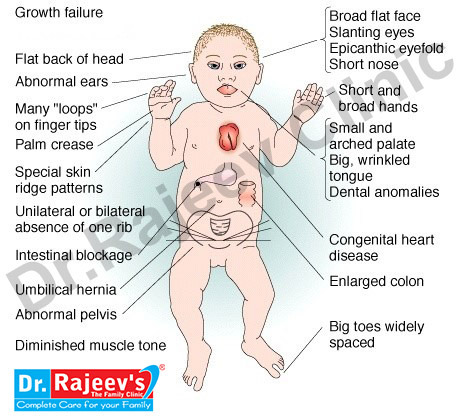

Down syndrome is a genetic disorder caused when abnormal cell division results in an extra full or partial copy of chromosome 21. This extra genetic material causes the developmental changes and physical features of Down syndrome.
Down syndrome varies in severity among individuals, causing lifelong intellectual disability and developmental delays. It is the most common genetic chromosomal disorder and cause of learning disabilities in children. It also commonly causes other medical abnormalities, including heart and gastrointestinal disorders.
Better understanding of Down syndrome and early interventions can greatly increase the quality of life for children and adults with this disorder and help them live fulfilling lives.
Each person with Down syndrome is an individual —
intellectual and developmental problems may be mild, moderate or severe.
Some people are healthy while others have significant health problems such as serious heart defects.
Children and adults with Down syndrome have distinct facial features.
some of the more common features include:
Infants with Down syndrome may be average size but typically they grow slowly and remain shorter than other children the same age.
Human cells normally contain 23 pairs of chromosomes. One chromosome in each pair comes from our father, the other from our mother.
Down syndrome results when abnormal cell division involving chromosome 21 occurs. These cell division abnormalities result in an extra partial or full chromosome 21. This extra genetic material is responsible for the characteristic features and developmental problems of Down syndrome. Any one of three genetic variations can cause Down syndrome:
Most of the time, Down syndrome isn't inherited. It's caused by a mistake in cell division during early development of the fetus.
Some parents have a greater risk of having a baby with Down syndrome. Risk factors include:
People with Down syndrome can have a variety of complications, some of which become more prominent as they get older. These complications can include:
For people with Down syndrome, getting routine medical care and treating issues when needed can help with maintaining a healthy lifestyle.
Life spans have increased dramatically for people with Down syndrome. Today, someone with Down syndrome can expect to live more than 60 years, depending on the severity of health problems.
Homeopathic Treatment depend upon the totality of symptoms and cause of the diease.Through a holistic approach,the aim is to find out the deviations from health. As in case of Down syndrome, because of the presence of an extra gene,the characteristic physical and mental symptoms appear. Now,this genetic makeup can not be altered but the expressions can.The identification of cause can be of great help. Homeopathically in such cases, the prenatal and family history is very important.There are many medicines in homeopathy which are prescribed according to the prenatal, natal, past and family history.
Constitutional – Individualized Medicine: The term constitutional and individualized medicines are commonly used in homeopathy. The aim of constitutional treatment is to find out the best possible individualized remedy for a case. The aim of such treatment is to improve the immune system as a whole so that a person with Down syndrome does not catch the infection, allergies and other diseases easily and also the recurrent tendency to a particular disease can also be reduced.
Acute – Chronic Diseases: In Down syndrome,there may be acute diseases, acute exacerbation of chronic disease and recurrent presentation of chronic diseases. Therefore,if we study the in-depth of a case we know the difference between an acute condition and acute presentation of a chronic disease.
Following medicines are commonly used in homeopathy as constitutional or specific or both in Down syndrome individuals:
NEUROPLUS